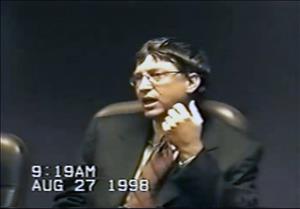On November 5, 1999, Federal District Court Judge Thomas Penfield Jackson (1937-2013) issues a formal finding of fact that Microsoft Corporation "enjoys monopoly power" in the market for computer operating systems. The ruling is a key stage in a federal antitrust complaint that went to trial in Washington, D.C., on October 19, 1998. Barring revision or settlement, the finding of fact could lead to punitive and/or corrective orders intended to reduce the market dominance of Windows and other Microsoft products.
Judge Jackson's findings filled 207 pages. He summarized his judgment as follows:
"Viewed together, three main facts indicate that Microsoft enjoys monopoly power. First, Microsoft's share of the market for Intel-compatible PC operating systems is extremely large and stable. Second, Microsoft's dominant market share is protected by a high barrier to entry. Third, and largely as a result of that barrier, Microsoft's customers lack a commercially viable alternative."
U.S. Attorney General Janet Reno declared the announcement "a great day for American consumers" and a victory for "innovation, competition, and the consumers' right to choose the products they want." Microsoft chairman William H. "Bill" Gates III rejected the judge's analysis. "We respectfully disagree with the court's findings," he said. "Microsoft competes vigorously and fairly."
The U.S. Department of Justice filed the antitrust complaint against Microsoft at the urging of manufacturers of alternative operating systems and Internet browsers, who alleged that the Redmond-based company employed illegal and unfair tactics to limit competition and control prices. Much of the controversy focused on the "bundling" of Microsoft's Internet Explorer with new editions of the Windows operating system, which competitors such as Netscape claimed prevented their ability to compete in the browser market.
On June 28, 2001, a federal appeals court, while upholding much of Jackson's ruling and agreeing that Microsoft had violated antitrust laws, unanimously reversed the order for the breakup of the company. The appellate court, in a rebuke to Jackson, stated that he had engaged in "serious judicial misconduct" by making derogatory comments about the company during and after the trial. Immediately after the appeals judgment, Microsoft stock surged $3.82, to $74.96. The appellate court appointed a different judge to impose a punishment other than breakup, but the company and the Department of Justice negotiated a settlement of the case before a new hearing was held.

